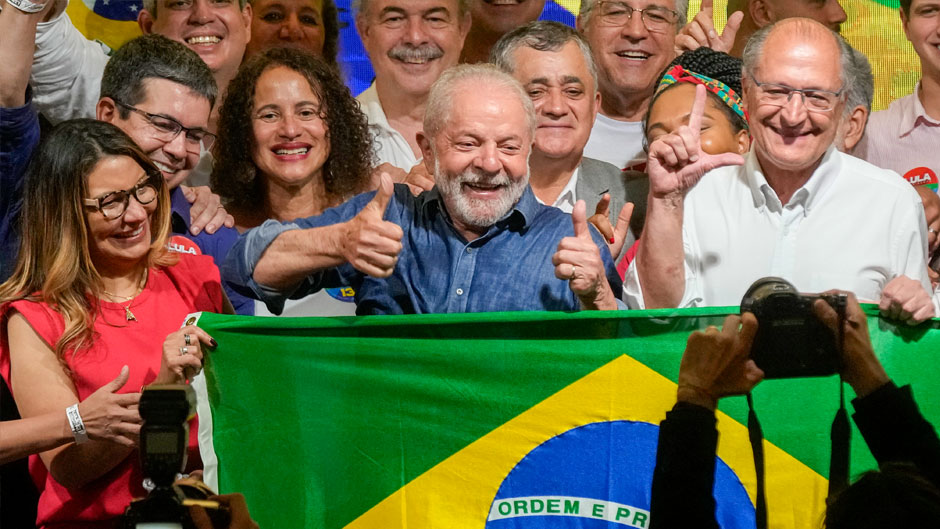Brazil has elected a left-wing president, Inácio “Lula” da Silva, who has promised to unite the deeply divided country, improve economic conditions, and seek international cooperation to preserve the Amazon.
Da Silva, a former president who was jailed on corruption charges but was later exonerated, narrowly beat the incumbent president Jair Bolsonaro, a right-wing former military officer who came to power in 2019. Bolsonaro’s administration accepted the victory last week and began the procedures for transition of power.
Under the Bolsonaro regime, there had been an increase in the decimation of Indigenous areas and disregard and displacement of native peoples. News reports said that in 2022 the amount of deforestation in the Amazon had reached a new high, while environmental protection had been weakened.
Da Silva has pledged to reverse the decimation of the Amazon and institute a series of green initiatives that would protect the world’s largest rainforest.
Tracy Devine Guzmán, associate professor of Latin American Studies and co-coordinator of the Native American and Global Indigenous Studies program at the University of Miami, is hopeful that da Silva will keep his campaign promises to benefit people and the environment.
“He has begun by asserting a zero-deforestation policy,” said Devine Guzmán. “This statement is extremely important because he made the environment a central part of his campaign, and because so many people around the world have been paying greater attention to the Amazon since Bolsonaro came into office. The images and the news have been horrific.”
In his acceptance speech, da Silva announced that the environment is one of his top priorities, alongside addressing hunger and poverty.
“I think Lula's victory, and in particular his victory speech, shows how his party has been pulled by Indigenous and environmental activists into more climate friendly positions,” said Sam Johnson, a Ph.D. candidate in Literary, Cultural, and Linguistic Studies who has studied Brazil’s environmental policies. “The Amazon and deforestation clearly serve as the flashpoint issue for this movement.”
The new leader has promised to appoint a minister of Indigenous Affairs, a post that would provide a voice to the country’s Indigenous population and promote their concerns. “This post is important because it would give a permanent role in governance to Indigenous peoples, beyond picture taking and symbolism,” said Devine Guzmán.
That ministry would also ensure that Indigenous lands will be protected. Under the Bolsonaro administration, these lands were subject to illegal deforestation, mining, and the proliferation of agro-business, as well as to an onslaught of proposals for anti-Indigenous legislation, she noted.
According to Devine Guzmán, the path ahead will not be easy. In a systematic, strategic way, the Bolsonaro administration defunded most of the environmental organizations that had previously promoted and ensured the protection of the rainforest. Those agencies will have to be re-funded and re-staffed—an initiative that could take many months, she added.
Da Silva will also face a Congress dominated by conservative legislators, many of whom are Bolsonaro allies.
“Lula will be able to undo some of the policy related to mining, land-grabbing, and logging by the Bolsonaro government through executive level policy and various agencies, but he faces a conservative congress with many former members of the right-wing government finding seats in congress,” said Johnson.
Nonetheless, many remain optimistic for the new administration. Da Silva’s government will face challenges building support for a new sustainable development agenda, but during his first administration, when he was in office from 2003-2010, he held an excellent record for preventing deforestation, even though he was criticized for endorsing large infrastructure projects including major dams in Amazonian states.
Devine Guzmán said that she believes that the key to da Silva’s success will be in proceeding with projects that support sustainable development in collaboration with Indigenous leadership and an international support network. His advisors have proposed a policy of subsidizing loans to farmers who agree to meet certain targets related to sustainable agriculture practices.
Da Silva has already said he will reestablish international cooperation from countries like Norway and Germany, who wish to resume contributions to Amazonian protection that were suspended during Bolsonaro’s administration. Last August, he asked for the European Union’s help in preserving the rainforest’s biodiversity while exploring its economic opportunities.

